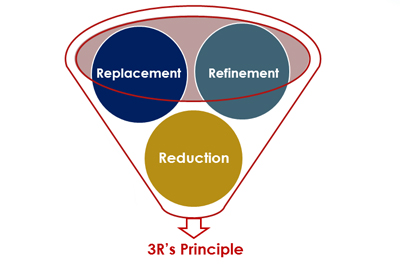Facility Access Requirements
Projects initiation will be planned as per the master schedule of the facility; hence advance notification should be given to the facility. Biometric card/fingerprint access will be issued to an individual when all of the following are completed:
Active Form-B approval
Facility Access Procedure
Access to the facility will be provided by the submission of an access request only. Completed forms should be returned to “The Coordinator, CPT” electronically (cpt@jssuni.edu.in) as a scanned copy (PI signature is required) or as hard copy.
Working guidelines at CPT Preclinical Facility
- Investigator should have a valid IAEC approval for conducting the study. As per Form -B submission, only the investigator and co-investigator will be permitted to work in the facility
- Candidate is advised to get vaccinated (TT) before initiating animal study.
- Candidate has to provide study details viz, study initiation and completion date, behavioural assay date, if any, necropsy date, well in advance to the CPT office. Any changes in the study date has to be informed in advance.
- Candidate should enter the CPT vivarium with hand gloves, face mask, shoe cover and apron. In no case CPT will provide personal protective equipment (PPE) and also the candidate will not be allowed inside vivarium without PPE
- Candidate should enter the entry and exit time in the log book at the facility entrance.
- The investigator should attend his/her allotted animals daily following the receipt and during experimentation.
- CPT is not responsible for any spontaneous mortality and morbidity of animals
- All consumables required for conduct of the study including drugs, oral gavage, blood collection and necropsy requirements, anaesthesia/euthanasia agents (only CCSEA approved drug should be used), glass and plasticwares etc. should be brought by the candidate, CPT will not provide any consumables/chemicals
- Based on the CPT master schedule, coordinator will allocate the experimental room and dates of initiation of study. This is to avoid the overlap in the use of facilities
- The candidate should confine his/her movement only to the allocated experimental room (entering in to other experimental rooms is strictly discouraged). Use of camera, music gadgets, photo/videography is prohibited. However, if experimental protocol mandates photography, it will be permitted with due approval from the Coordinator
- Candidates using various behavioural facilities - mazes, camera, etc should ensure the cleanliness, working condition of the gadgets. Any breakage to camera, mazes should be borne by the user
- Candidates to understand the CPT biomedical waste disposal procedure and abide to it. For assistance, please contact CPT technician
- Technical or scientific information of the project shall not be disclosed with CPT members or coordinator
Facility Hours of Operation
Facility access is limited to the hours of 9.30 a.m. to 5.30 p.m., although specific exceptions may be granted when required by the animal protocol. Standard light cycles for animal rooms are set at 6 a.m. for lights on and 6 p.m. for lights out in order to allow research animals to maintain a regular circadian rhythm. Entrance to animal rooms after 6 p.m. is specifically restricted as it may have a detrimental effect on animal welfare, specifically influencing circadian rhythm and the stress response.
Occupational Health Program
Occupational Health Program is mandatory for all faculty, students, and caretakers while working in animal facility. The purpose and goal of the Occupational Health Program is to identify, evaluate, manage, and reduce potential health risks associated with the care and use of animals at the institution.
All personnel to have vaccinated before start of the research on animals
Laboratory animal allergies are relatively common in work-related condition. Personnel with history of atopy, uticaria and pre-existing non-work related allergies make ensure his/her safety according to their medical needs
Pregnant women are advised to restrict working with animals
Periodic pest control program is in practice to prevent and control vermin in animal facilities
Animal Requisition Process and Procedure
An active IAEC approved protocol is necessary for ordering animals. CPT will procure animals for the investigators from CCSEA, Govt. of India, approved (with valid registration) commercial breeders or imports from approved sources.
For more details, please contact "The Coordinator, CPT, JSS AHER"
Security
The facility is provided with 24X7 security service for safety and to handle emergency conditions. Entry and exit of personnel is also recorded manually.
To ensure the study safety and confidentiality, data safety, biometric access is in place in the key area of the facility.
